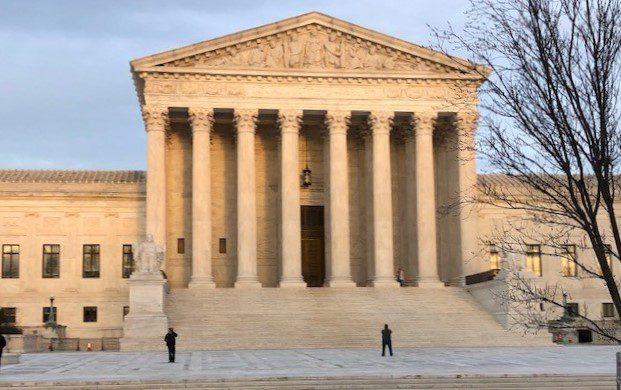

By: Katelynn Richardson (Daily Caller)
Some Supreme Court justices appeared concerned Thursday with the implications of letting the Trump administration enforce its birthright citizenship ban, though several remained skeptical about lower courts’ use of universal injunctions.
Following three lower court decisions blocking the president’s executive order on birthright citizenship, the administration in April asked the Supreme Court to let it take effect, arguing district court judges should not be able to override the executive branch by issuing nationwide injunctions that block policies across the entire country.
Solicitor General John Saur told the justices on Thursday there have been 40 universal injunctions blocking executive policies since the start of the Trump administration. Tensions between the courts and the administration have only grown over the past months, with White House officials calling out district court judges for abusing their authority.
The constitutionality of birthright citizenship, while not directly at issue in the case, was the elephant in the room. Tipping their hand to their views, the court’s liberal justices suggested that letting the order take effect now would strip children born to illegal immigrants of a right secured by prior precedent.
“Let’s just assume you’re dead wrong,” Justice Elena Kagan said. “How do we get to that result?”
If the policy cannot be blocked until the Supreme Court addresses the merits, potentially years down the line, there would be “an untold number of people, who according to all the law this court has ever made, ought to be citizens, who are not being treated as such,” Kagan continued.
The arguments, which spanned over two hours, at times grew heated. Sotomayor strongly suggested the executive order violates past precedent, prompting Chief Justice John Roberts to ask her to allow Saur to finish his answer.
Justice Samuel Alito, who has chided his colleagues in recent opinions for their handling of lower court orders on the emergency docket, questioned how the government’s position on universal injunctions would solve the underlying practical issue.
“The practical problem would not be solved,” he said. “And if that’s the case, what is the point of this argument about universal injunctions?”
There was some discussion about whether a class action lawsuit could provide the needed relief, without requiring a universal injunction. What the justices really wanted to know was how they should go about resolving the matter quickly to avoid creating confusing problems on the ground.
“What do hospitals do with a newborn?” Kavanaugh asked Saur. “What do states do with a newborn?”
“I don‘t think they do anything different,” Saur replied. “What the executive order says in section two is that federal officials do not accept documents that have the wrong designation of citizenship from people who are subject to the executive order.”
Barret also questioned Saur on whether the administration would follow precedent within the Second Circuit, to which he replied, it is “generally” their practice.
“This administration’s practice, or the longstanding practice of the federal government?” she pressed.
Yet several justices maintained concern about reining in the use of universal injunctions.
“All Article III judges are vulnerable to an occupational disease, which is the disease of thinking that ‘I am bright and can do whatever I want,'” Alito said. “On a multi-member appellate court, that is restrained by one’s colleagues. But a trial judge, sitting in the trial judge’s courtroom, is the monarch of that realm.”
Justice Clarence Thomas constantly pressed attorneys on the history of universal injunctions. In a prior 2018 opinion in United States v. Hawaii, Thomas expressed skepticism that district courts have the authority to use them.
“This case is very different from a lot of our nationwide injunction cases, in which many of us have expressed frustration at the way district courts are doing their business,” Kagan said, noting the issue often stems from plaintiffs forum shopping. “This case, what’s problematic about it, is that the courts keep deciding the same way. And nobody really thinks that the lower courts are going to do anything different.”
Trump issued his executive order on “Protecting the Meaning and Value of American Citizenship,” which would end guaranteed citizenship for children of illegal aliens or migrants on temporary visas, on his first day in office.
Before oral arguments, Trump wrote on Truth Social that birthright citizenship is about the “babies of slaves.”
“Birthright Citizenship was not meant for people taking vacations to become permanent Citizens of the United States of America, and bringing their families with them, all the time laughing at the “SUCKERS” that we are!” he wrote. “The United States of America is the only Country in the World that does this, for what reason, nobody knows.”